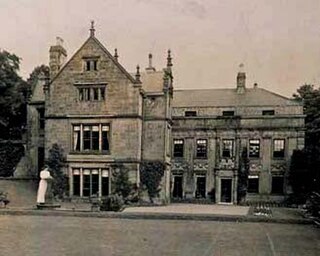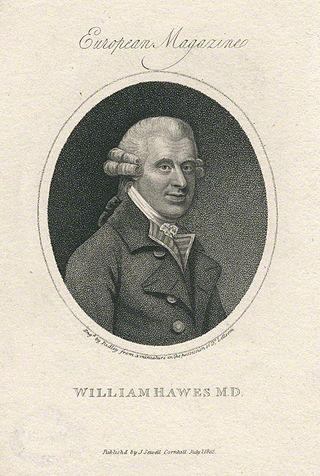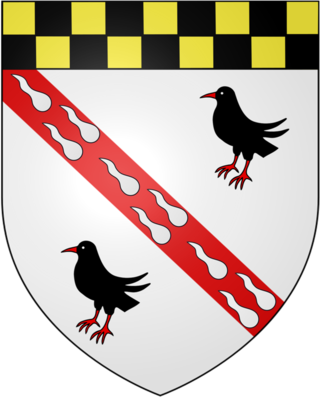
Benjamin Harrison V was an American planter, merchant, and politician who served as a legislator in colonial Virginia, following his namesakes' tradition of public service. He was a signer of the Continental Association, as well as the United States Declaration of Independence, and was one of the nation's Founding Fathers. He served as Virginia's governor from 1781 to 1784.

Archibald David Constable was a Scottish publisher, bookseller and stationer.

Richard Bland, sometimes referred to as Richard Bland II or Richard Bland of Jordan's Point, was an American Founding Father, planter, lawyer and politician from Virginia. A cousin and early mentor of Thomas Jefferson, Bland served 34 years in the Virginia General Assembly, and with John Robinson and this man's cousin Peyton Randolph as one of the most influential and productive burgesses during the last quarter century of the colonial period.

John Murray, 3rd Duke of Atholl, KT, PC, known as John Murray until 1764, was a Scottish peer and Tory politician.

William Strahan was a Scottish printer and publisher, and a politician who sat in the House of Commons between from 1774 to 1784. He was a correspondent and later a good friend of Benjamin Franklin.
Wootton Bassett was a parliamentary borough in Wiltshire, which elected two Members of Parliament (MPs) to the House of Commons from 1447 until 1832, when the rotten borough was abolished by the Great Reform Act.

Thomas Assheton Smith (the younger) (2 August 1776 – 9 September 1858) was an English landowner and all-round sportsman who was notable for being one of the outstanding amateur cricketers of the early 19th century. He was a Tory politician who sat in the House of Commons from 1821 to 1837. He was also known for his pioneering work on the design of steam yachts in conjunction with the Scottish marine engineer Robert Napier.

Abel Smith of Wilford House in the parish of Wilford, near Nottingham, England, was one of the leading bankers of his time and served thrice as a Member of Parliament.

George Greville, 2nd Earl of Warwick, FRS, FSA, styled Lord Greville until 1773, was a British nobleman and politician.

Thomas Brand Hollis, born Thomas Brand, was a British political radical and dissenter.
Sir James Dalrymple, 2nd Baronet was Member of Parliament for Haddington Burghs and the Principal Auditor of the Exchequer in Scotland.
Lord Robert Seymour was a British politician who sat in the Irish House of Commons from 1771 to 1776 and in the British House of Commons from 1771 to 1807. He was known as Hon. Robert Seymour-Conway until 1793, when his father was created a marquess; he then became Lord Robert Seymour-Conway, but dropped the surname of Conway after his father's death in 1794.

Brymbo Hall, one of Britain's lost houses, was a manor house located near Brymbo outside the town of Wrexham, North Wales. The house, reputed to have been partly built to the designs of Inigo Jones, was noted as the residence of 18th-century industrialist and ironmaster John "Iron-Mad" Wilkinson.

The Honourable Robert Curzon, of Parham Park, Sussex, was a long-standing British Member of Parliament.

John Scott-Waring (1747–1819) was an English political agent of Warren Hastings, publicist and Member of Parliament.

William Hawes M.D. (1736–1808) was an English physician and philanthropist, founder of the Royal Humane Society. As well as his work to spread the practice of resuscitation, he was concerned to relieve poverty in east London.

Gabriel Pleydell of Midg Hall in the parish of Lydiard St John in Wiltshire, was an English landowner and politician who served as Member of Parliament for the Wootton Bassett and Marlborough constituencies in the Parliament of England. Pleydell was born before 1519 into a large, affluent family. He entered politics in March 1553 as a member for Wootton Bassett, close to his family estate at Midgehall in Wiltshire. Pleydell's election to the Marlborough constituency two years later may have been made possible by his father's influential connections. He returned to the Wootton Bassett seat at the request of Sir John Thynne in 1563; he had supported Thynne in a dispute over the Knighthood of the Shire in 1559.
John Pringle, Lord Haining was a Scottish lawyer, politician, and judge. His ownership of a large estate near Selkirk secured him a seat in the Parliament of Scotland from 1702 until the Act of Union in 1707, and then in the House of Commons of Great Britain from 1707 until he became a Lord of Session in 1729.

John Pringle (c.1716-1792), was a Scottish merchant and politician who sat in the House of Commons between 1765 and 1786.
John Denison was Member of Parliament for the English constituencies of Wootton Bassett (1796-1802), Colchester (1802-1806), and Minehead (1807-1812).














